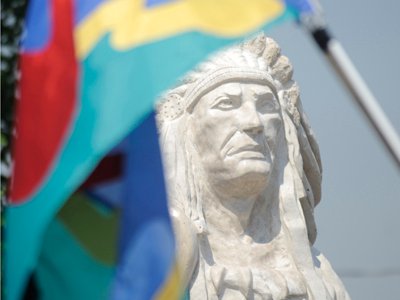Chief Pocatello signs peace treaty
The Shoshone chief Pocatello signs the Treaty of Box Elder, bringing peace to the emigrant trails of southern Idaho and northern Utah.
Pocatello was a Bannock Shoshone, one of the two major Shoshone tribes that dominated modern-day southern Idaho. Once a large and very powerful people, the Shoshone lost thousands to a smallpox epidemic in 1781. The fierce Blackfoot Indians took further advantage of the badly weakened Shoshone to push them off the plains and into the mountains. The first representatives of a people who would soon prove even more dangerous than the Blackfoot arrived in August 1805: The expedition of Meriwether Lewis and William Clark.
Anxious to establish good relations with the Americans in hopes of someday obtaining guns to fight the dreaded Blackfoot, the Shoshone welcomed Lewis and Clark and gave them the horses they needed to cross the Rocky Mountains. However, by the time Pocatello had become a chief 50 years later, the Shoshone realized the white people were more of a threat than the Blackfoot.
By 1857, Pocatello was a young chief who controlled an extensive territory around present-day Pocatello, Idaho. Pocatello was greatly alarmed by the growing number of Mormons who were traveling north from Salt Lake City and settling in Shoshone territory. The Indians and Mormons increasingly clashed, with both sides committing brutal and unjustified murders. Pocatello was determined to resist the white settlement. He led several attacks on the Mormons, killing or wounding several of them and stealing their horses.
In 1863, the U.S. government sent Colonel Patrick Connor and a company of soldiers into the region to protect American telegraph lines and, secondarily, the Mormon settlers. That May, Connor set out to track down Pocatello and his followers, but the Shoshone chief managed to evade the soldiers. On his own initiative, Pocatello then proposed a peace agreement. If the Mormons provided the Shoshone with compensation for lost game and land, Pocatello promised to cease his attacks. The Mormons accepted his terms.
On this day in 1863, Pocatello signed his “X” on the Treaty of Box Elder and the overt hostilities ended. As the Anglo settlers in the region grew more numerous and gained the support of the U.S. government, the Shoshone were confined to a reservation within their traditional territory. Pocatello died on the reservation in 1884. The nearby Idaho city of Pocatello was named for him.
